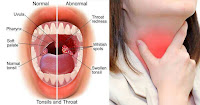HEALTH WITH HIFAD
Welcome to another enlightening session of health with Hifad
What is a sore throat?
A sore throat can involve irritation, pain, and itchiness that can make it hard to swallow.Visit your doctor if your sore throat lasts longer than a week and if it’s accompanied by other symptoms, like a fever, rash, joint pain, or difficulty breathing.
Treatments
include gargling with warm salt water, throat lozenges, anti-inflammatory medicines, and other medications.A sore throat refers to pain, itchiness, or irritation of the throat. It may cause difficulty swallowing food and liquids, and the pain may get worse when you try to swallow. Throat pain is the primary symptom of a sore throat. However, other symptoms may include
:*.a dry throat
*.swollen glands in the neck
*.white patches on the tonsils
*.hoarseness
A sore throat can affect people of all ages, but the risk of a sore throat is higher in some people. This includes:
*.children
*.people who smoke
*.people with allergies
*.people with a compromised immune system
Sharing a close space with others also increases the risk of upper respiratory infections that can initially present as a sore throat.
Causes of a sore throat
Several things can cause a sore throat.
Viral infection
Most sore throats are triggered by a viral infection. These are infections caused by a virus, such as the common cold or the flu.Other types of viral infections include:
*.mononucleosis, which is an infectious disease typically transmitted through saliva
*.measles, which is a contagious illness characterized by a distinct rash and fever
*.chickenpox, which is an infection that causes skin sores
*.croup, which is an infection of the larynx
Bacterial infection
A bacterial infection can also cause a sore throat. These types of infections include:
*.strep throat, which is an inflammation of the throat caused by theStreptococcus pyogenes bacteria
*.diphtheria, which causes throat inflammation
*.whooping cough, which affects the respiratory mucous membraneEnvironmental factorsNot all sore throats are viral or bacterial.
Several other things can cause throat pain.
*.If you’reallergicto mold, pet dander, pollen, or other irritants, exposure to these allergens can trigger postnasal drip. Postnasal drip occurs when excess mucus accumulates in the back of your throat. This accumulation can irritate your throat and cause pain or inflammation.
*.Dry air can make your throat feel raw and scratchy.
*.Smoking cigarettes or breathing incigarette smoke can trigger persistent sore throats.
*.Yelling or too much talking can
How is a sore throat treated?
The treatment for a sore throat depends on the cause. However, you can treat many sore throats at home. Home treatment options include:
*.gargling with warm salt water
*.drinking plenty of warm fluids, such as tea, soup, and water
*.avoiding allergens and irritants, such as smoke and chemicals
*.taking throat lozenges
*.reducing inflammation withibuprofen(Advil)
*.using medications such asacetaminophen(Tylenol)
How to prevent a sore throat
Many underlying causes of sore throats are infectious, and there are certain steps that can help you prevent future infection. Repeatedly washing your hands throughout the day kills the germs and bacteria that can cause viral and bacterial infections. Additional steps you can take to prevent a sore throat include the following:
*.not sharing drinking glasses or utensils
*.using hand sanitizers whenever soap and water aren’t available
*.limiting contact with commonly touched surfaces
*.reducing exposure to allergens, such as pollen, dust, and mold
*.avoiding cigarette smoke
*.keeping a humidifier in your houseto eliminate dryness
Source --- Healthline..
HiFAD...
Let's save Africa's future..
Compiled by Olamide peter CEO HIFAD
Aminu Peter olamide
Instagram _ola_peters
Facebook ola peters
What is a sore throat?
A sore throat can involve irritation, pain, and itchiness that can make it hard to swallow.Visit your doctor if your sore throat lasts longer than a week and if it’s accompanied by other symptoms, like a fever, rash, joint pain, or difficulty breathing.
Treatments
include gargling with warm salt water, throat lozenges, anti-inflammatory medicines, and other medications.A sore throat refers to pain, itchiness, or irritation of the throat. It may cause difficulty swallowing food and liquids, and the pain may get worse when you try to swallow. Throat pain is the primary symptom of a sore throat. However, other symptoms may include
:*.a dry throat
*.swollen glands in the neck
*.white patches on the tonsils
*.hoarseness
A sore throat can affect people of all ages, but the risk of a sore throat is higher in some people. This includes:
*.children
*.people who smoke
*.people with allergies
*.people with a compromised immune system
Sharing a close space with others also increases the risk of upper respiratory infections that can initially present as a sore throat.
Causes of a sore throat
Several things can cause a sore throat.
Most sore throats are triggered by a viral infection. These are infections caused by a virus, such as the common cold or the flu.Other types of viral infections include:
*.mononucleosis, which is an infectious disease typically transmitted through saliva
*.measles, which is a contagious illness characterized by a distinct rash and fever
*.chickenpox, which is an infection that causes skin sores
*.croup, which is an infection of the larynx
Bacterial infection
A bacterial infection can also cause a sore throat. These types of infections include:
*.strep throat, which is an inflammation of the throat caused by theStreptococcus pyogenes bacteria
*.diphtheria, which causes throat inflammation
*.whooping cough, which affects the respiratory mucous membraneEnvironmental factorsNot all sore throats are viral or bacterial.
Several other things can cause throat pain.
*.If you’reallergicto mold, pet dander, pollen, or other irritants, exposure to these allergens can trigger postnasal drip. Postnasal drip occurs when excess mucus accumulates in the back of your throat. This accumulation can irritate your throat and cause pain or inflammation.
*.Dry air can make your throat feel raw and scratchy.
*.Smoking cigarettes or breathing incigarette smoke can trigger persistent sore throats.
*.Yelling or too much talking can
How is a sore throat treated?
The treatment for a sore throat depends on the cause. However, you can treat many sore throats at home. Home treatment options include:
*.gargling with warm salt water
*.drinking plenty of warm fluids, such as tea, soup, and water
*.avoiding allergens and irritants, such as smoke and chemicals
*.taking throat lozenges
*.reducing inflammation withibuprofen(Advil)
*.using medications such asacetaminophen(Tylenol)
How to prevent a sore throat
Many underlying causes of sore throats are infectious, and there are certain steps that can help you prevent future infection. Repeatedly washing your hands throughout the day kills the germs and bacteria that can cause viral and bacterial infections. Additional steps you can take to prevent a sore throat include the following:
*.not sharing drinking glasses or utensils
*.using hand sanitizers whenever soap and water aren’t available
*.limiting contact with commonly touched surfaces
*.reducing exposure to allergens, such as pollen, dust, and mold
*.avoiding cigarette smoke
*.keeping a humidifier in your houseto eliminate dryness
Source --- Healthline..
HiFAD...
Let's save Africa's future..
Compiled by Olamide peter CEO HIFAD
Aminu Peter olamide
Instagram _ola_peters
Facebook ola peters





Comments
Post a Comment